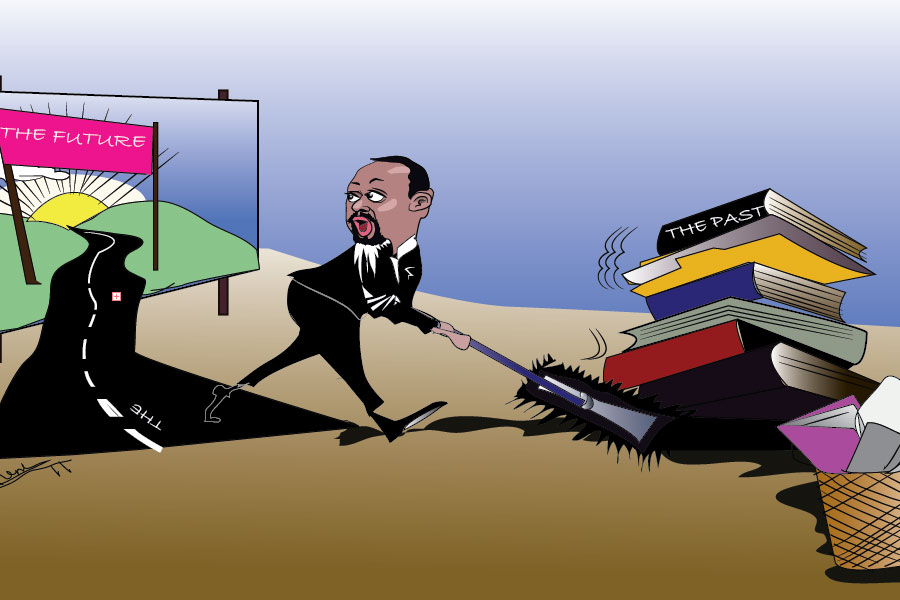
Editorial | Feb 01,2019
Apr 24 , 2021
By Halima Abate (MD)
It is not easy to describe democracy in just one sentence, but the phrase “majority rule and minority rights” comes close. Its fundamental layout encompasses the equality of human beings, the unalienable rights of life, liberty and the pursuit of happiness. Hence, democracy is a course of action where individual’s self-rule exerts collective harmony, creating a political unit that attains socio-economic progress.
As a principle, a healthy political environment includes the right to the ballot as a way of influencing public policy and governance. Elections are critical for choosing our representatives in government and giving a temporary but stable mandate for the exercise of power. But every time citizens opt not to exercise their right to vote; democracy is severely diminished.
No one disputes that voting is a fundamental right, where the notion that we govern ourselves by free choice is affirmed. Voting represents the beginning; everything else in our democracy follows. We sometimes imagine that voting involves nothing more than showing up at the polling booth for a few minutes and putting our voice in the ballot box.
However, the process comes from and is guided by our feelings, values, principles, assumptions and knowledge. Many of these stem from our backgrounds, cultures, and experiences. It also arises from our conscious decisions about what is right, the virtues that we aspire toward, and the beliefs that motivate us. The goal of political discourse is to inform our conscious decision-making beyond what backgrounds and cultures we come from – it is an appeal to reason-based self-governance.
Political parties have an expanded role to play in this. They are positioned to promote policy alternatives on key issues affecting public administration and governance. They also have a sizeable influence in the productiveness and fairness of the exchange of ideas. An example of how a lack of this could negatively affect national discourse was evident in the conduct of former US President Donald Trump during the 2016 and 2020 elections.
Bridging gaps and being accountable in conveying one's ideas to the public is necessary for the democratic process. It creates goodwill between parties and allows them to express themselves in a manner that would not automatically turn off the other side.
Thus, how should we conceive of and discuss the right to vote and its associated controversies?
Differentiating between protecting an individual's right to vote and merely ensuring equality among voters has both theoretical and practical consequences. If we believe that everyone should have a voice in our democracy, we should also eliminate avoidable burdens that might affect all voters. As the first-line actors in the election process, governments should better protect the individual right to vote by guaranteeing an opportunity to participate for all voters.
When some citizens fail to exercise their right to vote, observers must question the degree to which government by the people exits. The phrase “free and fair elections” has two critical components. “Free” has mainly to do with the integrity of ballots, and almost entirely concerns the electoral body. "Fair" is another matter. It relates to the independence of democratic institutions. The courts, security forces and public media should be perceived to be autonomous enough for voters to have confidence in the electoral process.
Political participation will be most effective when there is awareness created regarding democratic values. A citizenry that participates only by occasionally voting in elections will not cut it; it will be a knee-jerk reaction that fails to comprehend the full extent of the country’s political life. Direct engagement in debating and deciding public issues is the civic virtue that sustains democracy. The key aspect of that virtue is for citizens to look beyond their individual self-interest to the larger needs of the community.
PUBLISHED ON
Apr 24,2021 [ VOL
22 , NO
1095]


Editorial | Feb 01,2019

Viewpoints | Dec 29,2018

Verbatim | May 04,2019

Fineline | May 02,2020

Editorial | Nov 13,2021

Commentaries | Jun 19,2021

Editorial | Oct 28,2023

Viewpoints | May 15,2021

Commentaries | Jul 06,2019

My Opinion | Aug 07,2021

Photo Gallery | 179398 Views | May 06,2019

Photo Gallery | 169594 Views | Apr 26,2019

Photo Gallery | 160506 Views | Oct 06,2021

My Opinion | 137176 Views | Aug 14,2021
Commentaries | Oct 25,2025

Dec 22 , 2024 . By TIZITA SHEWAFERAW
Charged with transforming colossal state-owned enterprises into modern and competitiv...

Aug 18 , 2024 . By AKSAH ITALO
Although predictable Yonas Zerihun's job in the ride-hailing service is not immune to...

Jul 28 , 2024 . By TIZITA SHEWAFERAW
Unhabitual, perhaps too many, Samuel Gebreyohannes, 38, used to occasionally enjoy a couple of beers at breakfast. However, he recently swit...

Jul 13 , 2024 . By AKSAH ITALO
Investors who rely on tractors, trucks, and field vehicles for commuting, transporting commodities, and f...

Oct 25 , 2025
The regulatory machinery is on overdrive. In only two years, no fewer than 35 new pro...

Oct 18 , 2025
The political establishment, notably the ruling party and its top brass, has become p...

Oct 11 , 2025
Ladislas Farago, a roving Associated Press (AP) correspondent, arrived in Ethiopia in...

Oct 4 , 2025
Eyob Tekalegn (PhD) had been in the Governor's chair for only weeks when, on Septembe...

Oct 25 , 2025 . By YITBAREK GETACHEW
Officials of the Addis Abeba's Education Bureau have embarked on an ambitious experim...

Oct 26 , 2025 . By YITBAREK GETACHEW
The federal government is making a landmark shift in its investment incentive regime...

Oct 29 , 2025 . By NAHOM AYELE
The National Bank of Ethiopia (NBE) is preparing to issue a directive that will funda...

Oct 26 , 2025 . By SURAFEL MULUGETA
A community of booksellers shadowing the Ethiopian National Theatre has been jolted b...